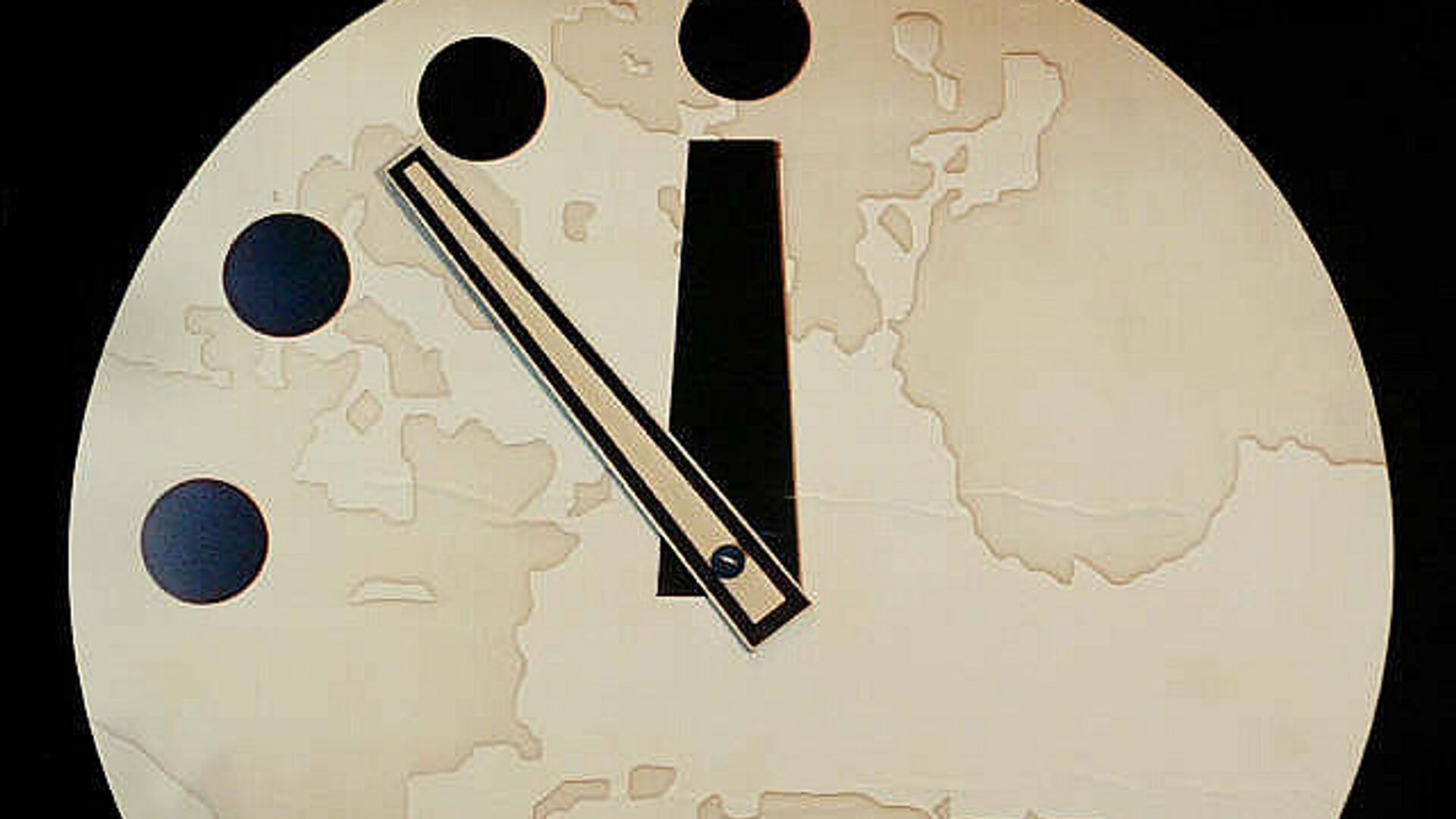https://sputnikglobe.com/20220121/doomsday-clock-remains-close-to-civilization-ending-apocalypse---atomic-scientists-1092413891.html
Doomsday Clock Remains Close to 'Civilisation-Ending Apocalypse' - Atomic Scientists
Doomsday Clock Remains Close to 'Civilisation-Ending Apocalypse' - Atomic Scientists
Sputnik International
WASHINGTON (Sputnik) - The Doomsday Clock remains the closest it has ever been to a civilisation-ending catastrophe due to a mix of global threats, including... 21.01.2022, Sputnik International
2022-01-21T01:18+0000
2022-01-21T01:18+0000
2022-01-21T06:57+0000
bulletin of the atomic scientists
doomsday clock
apocalypse
https://cdn1.img.sputnikglobe.com/img/101353/66/1013536684_0:77:640:437_1920x0_80_0_0_c63524016e51ffc5829fa0b8ed0a8d7a.jpg
The Bulletin of the Atomic Scientists, an organisation founded by Albert Einstein and Robert Oppenheimer, made the declaration during their 75th annual reading of the metaphorical countdown to armageddon."The members of the Science and Security Board find the world to be no safer than it was last year at this time and therefore decide to set the Doomsday Clock once again at 100 seconds to midnight", the group said in a statement on Thursday. In terms of mitigating steps, the organisation called on the US and Russian presidents to identify more ambitious limits on nuclear weapons and delivery systems by the end of this year. China, the release added, should commit to a no-first-use of nuclear weapons policy along with the United States and Russia.In addition, Iran and the United States should rejoin the nuclear deal and North Korea should codify its ban on nuclear and long-range missile tests, the release said.The group said the time is based on continuing threats posed by nuclear weapons, climate change, disruptive technologies, and COVID-19. They also said an environment of corrupt information that undermines rational decision making on these issues has exacerbated the threats.The Doomsday Clock has been set at 100 seconds to midnight for the last two years, the release noted.
Sputnik International
feedback@sputniknews.com
+74956456601
MIA „Rosiya Segodnya“
2022
Sputnik International
feedback@sputniknews.com
+74956456601
MIA „Rosiya Segodnya“
News
en_EN
Sputnik International
feedback@sputniknews.com
+74956456601
MIA „Rosiya Segodnya“
Sputnik International
feedback@sputniknews.com
+74956456601
MIA „Rosiya Segodnya“
bulletin of the atomic scientists, doomsday clock, apocalypse
bulletin of the atomic scientists, doomsday clock, apocalypse
Doomsday Clock Remains Close to 'Civilisation-Ending Apocalypse' - Atomic Scientists
01:18 GMT 21.01.2022 (Updated: 06:57 GMT 21.01.2022) WASHINGTON (Sputnik) - The Doomsday Clock remains the closest it has ever been to a civilisation-ending catastrophe due to a mix of global threats, including nuclear weapons and climate change, it has been revealed.
The Bulletin of the Atomic Scientists, an organisation founded by Albert Einstein and Robert Oppenheimer, made the declaration during their 75th annual reading of the metaphorical countdown to armageddon.
"The members of the Science and Security Board find the world to be no safer than it was last year at this time and therefore decide to set the Doomsday Clock once again at 100 seconds to midnight", the group said in a statement on Thursday.
"This decision does not, by any means, suggest that the international security situation has stabilised. On the contrary, the Clock remains the closest it has ever been to [a] civilisation-ending apocalypse".
In terms of mitigating steps, the organisation called on the US and Russian presidents to identify more ambitious limits on nuclear weapons and delivery systems by the end of this year. China, the release added, should commit to a no-first-use of nuclear weapons policy along with the United States and Russia.
In addition, Iran and the United States should rejoin the nuclear deal and North Korea should codify its ban on nuclear and long-range missile tests, the release said.
The group said the time is based on continuing threats posed by nuclear weapons, climate change, disruptive technologies, and COVID-19. They also said an environment of corrupt information that undermines rational decision making on these issues has exacerbated the threats.
The Doomsday Clock has been set at 100 seconds to midnight for the last two years, the release noted.



